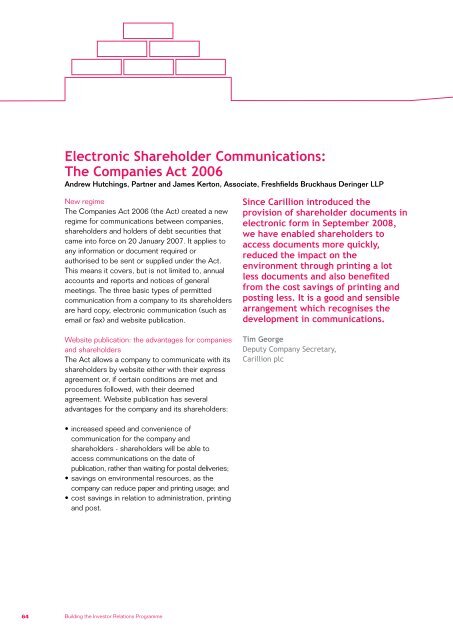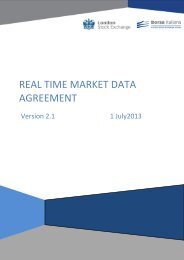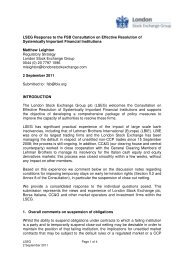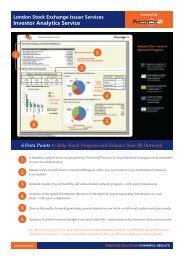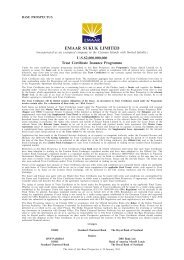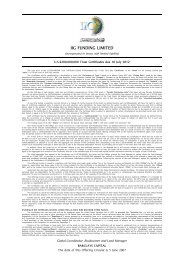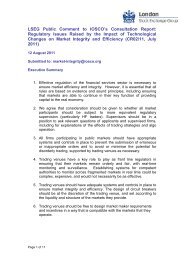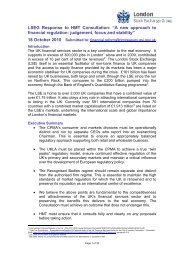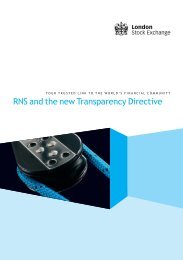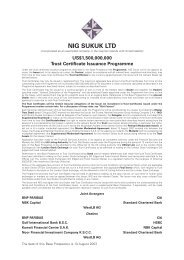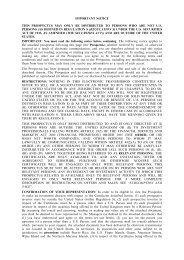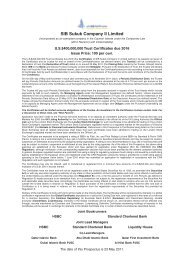Investor Relations - A Practical Guide - Investis
Investor Relations - A Practical Guide - Investis
Investor Relations - A Practical Guide - Investis
You also want an ePaper? Increase the reach of your titles
YUMPU automatically turns print PDFs into web optimized ePapers that Google loves.
Electronic Shareholder Communications:<br />
The Companies Act 2006<br />
Andrew Hutchings, Partner and James Kerton, Associate, Freshfields Bruckhaus Deringer LLP<br />
New regime<br />
The Companies Act 2006 (the Act) created a new<br />
regime for communications between companies,<br />
shareholders and holders of debt securities that<br />
came into force on 20 January 2007. It applies to<br />
any information or document required or<br />
authorised to be sent or supplied under the Act.<br />
This means it covers, but is not limited to, annual<br />
accounts and reports and notices of general<br />
meetings. The three basic types of permitted<br />
communication from a company to its shareholders<br />
are hard copy, electronic communication (such as<br />
email or fax) and website publication.<br />
Website publication: the advantages for companies<br />
and shareholders<br />
The Act allows a company to communicate with its<br />
shareholders by website either with their express<br />
agreement or, if certain conditions are met and<br />
procedures followed, with their deemed<br />
agreement. Website publication has several<br />
advantages for the company and its shareholders:<br />
Since Carillion introduced the<br />
provision of shareholder documents in<br />
electronic form in September 2008,<br />
we have enabled shareholders to<br />
access documents more quickly,<br />
reduced the impact on the<br />
environment through printing a lot<br />
less documents and also benefited<br />
from the cost savings of printing and<br />
posting less. It is a good and sensible<br />
arrangement which recognises the<br />
development in communications.<br />
Tim George<br />
Deputy Company Secretary,<br />
Carillion plc<br />
• increased speed and convenience of<br />
communication for the company and<br />
shareholders - shareholders will be able to<br />
access communications on the date of<br />
publication, rather than waiting for postal deliveries;<br />
• savings on environmental resources, as the<br />
company can reduce paper and printing usage; and<br />
• cost savings in relation to administration, printing<br />
and post.<br />
64<br />
Building the <strong>Investor</strong> <strong>Relations</strong> Programme


